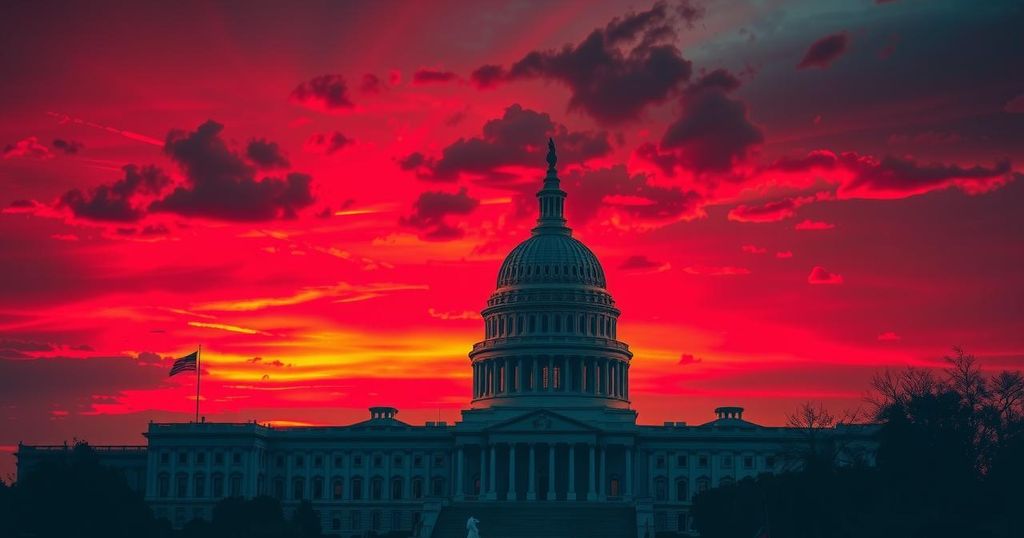Congressional Leaders React to Trump’s Order for Strike on Iran

Following President Trump’s announcement of U.S. airstrikes on Iranian nuclear sites, Congressional leaders expressed a mix of surprise, praise, and concern. Republicans generally supported the action, with some like Sen. Lindsey Graham commending it, while Democrats, including House Minority Leader Hakeem Jeffries and Senator Bernie Sanders, questioned the president’s authority and warned against escalating military entanglement. The discourse highlights a significant partisan divide on military action and constitutional rights.
In a surprising turn of events late Saturday, Congressional leaders reacted to President Donald Trump’s announcement regarding U.S. airstrikes on three Iranian nuclear sites. This controversial action has garnered mixed responses, with some Republicans praising the decision, while many Democrats raised questions about the president’s authority to act without congressional consent.
Sen. Lindsey Graham, a notable Republican voice from South Carolina and a staunch supporter of Israel, took to social media almost immediately after Trump’s announcement. He declared it “the right call,” asserting that the Iranian regime “deserves it.” Graham expressed pride in the U.S. Air Force, emphasizing their strength and capability.
On the opposite side of the aisle, House Minority Leader Hakeem Jeffries criticized the president’s actions, suggesting that Trump had “misled the country” about his intentions. Jeffries warned that the risk of war had significantly increased and urged for safety of U.S. troops potentially exposed to danger. He called for a thorough explanation for the military action and expressed concern over the lack of congressional authorization.
During a public event in Tulsa, Vermont Senator Bernie Sanders reacted to the attack by reading Trump’s post to a crowd that started to boo. Sanders labeled the strikes as “grossly unconstitutional,” insisting that only Congress possesses the authority to declare war.
Rep. Rick Crawford, Republican chair of the House Intelligence Committee, mentioned he had been in contact with the president prior to the strikes, while acknowledging Iran’s role in escalating tensions. He expressed gratitude that Trump recognized long-standing red lines concerning Iranian provocations.
However, not all Republicans were supportive of the president’s decision. Rep. Tom Massie from Kentucky expressed his concerns about the constitutionality of the airstrikes. Likewise, Democratic Rep. Jim Himes echoed this sentiment, emphasizing the need for a congressional discussion before any military action is taken, suggesting that decisions should not be made after the fact.
Rep. Ro Khanna from California called for an immediate vote on a War Powers Resolution to prevent further escalation into what he described as another “endless Middle East war.”
In the backdrop of these reactions, House Speaker Mike Johnson was reportedly briefed before the strikes and had to cancel a planned trip to Israel due to the volatile situation. Johnson supported the strikes, labeling them a “decisive” action necessary to prevent terrorism.
Furthermore, Senate Majority Leader John Thune was also briefed in advance. GOP Sen. John Barrasso praised the decision, stating that a nuclear-capable Iran poses a significant threat to both the U.S. and global safety. Texas Senator John Cornyn called the president’s decision “courageous” and a demonstration of strong leadership.
In contrast, Pennsylvania Democratic Senator John Fetterman noted his support for the strikes, emphasizing the danger of Iran as a leading sponsor of terrorism.
As these reactions unfold, the situation is still developing, and further updates will be provided as more information becomes available.
The Congressional response to President Trump’s order for airstrikes on Iranian nuclear sites reveals a deep divide between party lines. While some Republicans are voicing their support and approval, Democrats are raising significant concerns regarding constitutional authority and the potential for increased conflict. The situation remains fluid and continues to elicit strong reactions across the political spectrum, underscoring the seriousness and implications of such military actions.
Original Source: www.yahoo.com






